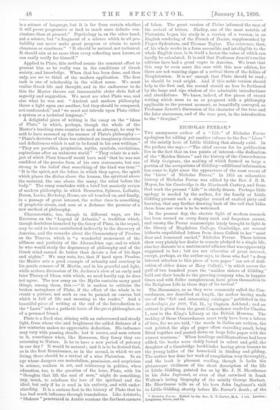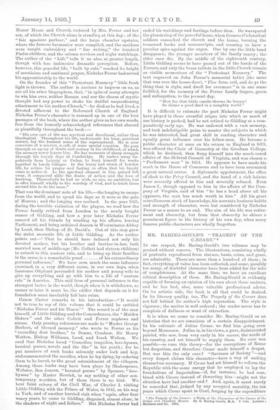NICHOLAS FERRAR.*
THE anonymous author of a " Life " of Nicholas Ferrer apologises for adding yet another volume to the five "Lives of the saintly hero of Little Gidding that already exist. In, the preface she says :—" The chief excuse for its publication, lies in the fact that on two points of interest—the dedication. of the "Maiden Sisters" and the history of the Concordances. of Holy Scripture, the making of which formed so large a portion of the occupations of Gidding—additional information. has come to light since the appearance of the most recent of' the 'Lives' of Nicholas Ferran" In 1855 an exhaustive. history of Nicholas Ferrer was edited by the Rev. J. E. B: Mayor, for his Cambridge in the Nineteenth Century, and from that work the present " Life " is chiefly drawn. Perhaps little- apology is needed by the author, for the family at Little. Gidding present such a singular record of exalted piety and learning, that any farther drawing back of the veil that hides. them from our view is to be welcomed.
In the present day, the electric light of modern research has been turned on every dusty nook and forgotten corner, and among the Ferrer manuscripts lately brought to light la- the library of Magdalene College, Cambridge, are several hitherto unpublished letters from Anna Collett to her "most dear and honoured unckel," Nicholas Ferrar. These letters. show very plainly her desire to remain pledged to a single life,. also her distaste to a matrimonial alliance that was apparently suggested to her ; but are not otherwise of great interest., except, perhaps, as the author says, to those who feel "a deep interest attaches to this piece of torn paper" (an act of dedi- cation of either Anna or Mary Collett), "in which across the gulf of two hundred years the maiden sisters of Gidding hold oat their hands to the growing company who, in happier times and with fuller completeness, have given themselves to. the Religious Life in these days of its revival."
The Harmonies, or as they were commonly called the Con- cordances, are described at length, the author having made use of the "full and interesting catalogue" published in the Archa?oZogia for 1888, 'Vol. IL, by Captain Ackland ; and an extract is given from the great Concordance made for Charles. I., now in the King's Library at the British Museum. The making of those Concordances must truly bare been a labour of love, for we are told, "the words in italics are written, the rest printed, the slips of paper often exceeding small, being fitted together and pasted down on large folio paper with the utmost neatness." When headings and illustrations had been added, the books were richly bound in velvet and gold, the daughter of a Cambridge bookbinder having given lessons to the young ladies of the household in binding and gilding. The author has done her work of compilation very thoroughly,. and the book is pleasant reading, though it lacks the picturesque vividness of the short description of the life at Little Gidding, painted for us by Mr. J. H. Shorthouse in his John Inglesant, or even of that entwined in Izaak Walton's loving biography of the saintly George Herbert Mr. Shorthouse tells us of his hero John Inglesant's visit to Little Gidding, shortly before Mr. Ferrar's death ; of the
• Nicholaa Farrar. Edited by the Rev, T. T, Carter, M.A. I vol. London:. Longmano, Green, and Co.
Manor House and Church, restored by Mrs. Ferrer and her son, of which the Church alone is standing at this day ; of the "fair spacious parlour," and the large chamber upstairs, where the famous harmonies were compiled, and the maidens were taught embroidery and "fine writing," the hundred Psalm-children, and the solemn services and night watehings. The author of the " Life" tells it us also, at greater length, though with less instinctive dramatic perception. Before, however, this peaceful life, "built by rule," reached its height of asceticism and continual prayer, Nicholas Ferrar had served his apprenticeship to the world.
On the founder of this "Protestant Nunnery" little fresh light is thrown. The author is anxious to impress on us, as are all his other biographers, that, "in spite of many attempts to win him over, neither Roman zeal nor the charm of mystic thought had any power to shake his dutiful unquestioning attachment to his mother-Church,"—he died as he had lived, a devoted adherent to the Reformed Church of England Nicholas Ferrar's character is summed up in one of the best passages of the book, where the author gives us her own words, free from the honestly acknowledged references that abound so plentifully throughout the book :—
"His own cast of life was mystical and devotional, rather than theological. Throughout his life, underneath his busy, practical nature, lay the keenest sense of the supernatural. He is over conscious of a mission, a call, of some special vocation. He goes through an agony of doubt and ecstacy in his childhood, of which the memory never leaves him. He has moments of sharp struggle through his boyish days at Cambridge. He rushes away im- pulsively from Leipzig or Padua, to bury himself for weeks together in lonely villages. In the hurry and strain of London life, he retires for prayer and fasting so often that his family cease to notice it. As the spiritual element in him gained full sway, it conquered alike the desire of action and the love of learning. Thenceforth he had no wish, no aim, no ambition, but to offer himself wholly to the worship of God, and to teach those around him to do the same."
That was the dominant note of his life,—the longing to escape from the world, and to spend his days as it were at the gate of Heaven ; and the longing was realised. In the year 1625, during the terrible visitation of the plague, we read how the Ferrar family retired from London to the newly bought manor of Gidding, and how a year later Nicholas Ferrar amazed all his friends by winding up his affairs, leaving Parliament, and being ordained deacon in Westminster Abbey by Laud, then Bishop of St. David's. Out of this step grew the strict monastic life at Little Gidding. As the author points out—" That he should have induced not only his devoted mother, but his brother and brother-in-law, both married men of middle-age (Mr. Collett had sixteen children) to submit to this austere rule, and to bring up their families
in the same, is a remarkable proof of his extraordinary personal influence." We have seen much the same influence exercised, in a, very different cause, in our own days, when Laurence Oliphant persuaded his mother and young wife to give up everything and go with him to a. life of "austere rule" in America. This said item of personal influence is the strongest factor in the world, though when it is withdrawn, as sooner or later it must be, the edifice that depends on it for foundation must inevitably fall into ruins.
Canon Carter remarks in his introduction—" It would not be tree to say of this volume that it could be entitled Nicholas Ferrer and his Times." The record is of the man himself, of Little Gidding and the Concordances, the "Maiden Sisters" and the other Collett and Ferrer nephews and nieces. Only passing references are made to "Master George Herbert, of blessed memory," who wrote to Ferrer as his
"exceeding dear brother," to Donne, Orashaw, Sir Henry Wotton, ishop Williams, Laud, and Izaak Walton. We
read that Nicholas loved "Comedies, tragedies, love-hymns, heroical poems, novels and the like" in his youth ; for he put numbers of such books solemnly under lock and key, and consummated the sacrifice, when he lay dying, by ordering them to be burnt, to the great astonishment of the villagers. Among those .books may have been plays by Shakespeare, Webster, Ben Jonson, "heroical poems" by Spenser, " love- hymns " by Master Herrick, to say nothing of other con- temporary worthies, but of them there is no hint. We hear faint echoes of the Civil War, of Charles I. visiting Little Gidding with the Prince of Wales, in 1642, on his way to York, and of another hurried visit when "again, after four weary years, he 'came to Gidding, disguised, almost alone, in the shadows of night and failure." But Nicholas Ferrar had ended his watchings and fastings before then. He was spared the plundering of the peaceful home, when Cromwell's fanatical soldiers ransacked the church and the house, burning the treasured books and manuscripts, and seeming to have a peculiar spite against the organ. One by one the little band disappears; the younger members of the family marry ; the elder ones die. By the middle of the eighteenth century, Little Gidding seems to have passed out of the hands of the Ferrars, and only the brass tablets in the little Church remain as visible mementoes of the "Protestant Nunnery." The text engraved on John Ferrar's memorial tablet (the same that was over the houee-door), "Flee from evil, and do ye the thing that is right, and dwell for evermore" is in one sense- fulfilled, for the memory of the Ferrer family lingers, green and unforgotten, to the present day.
"How far that little candle throws its beams !
So shines a good deed in a naughty world."
It is difficult to estimate the part Nicholas Ferrer mightr have played in those eventful reigns into which so much of our history is packed, had be not retired to Gidding at a com- paratively early age. He was endowed with a vast memory,. and took indefatigable pains to master the subjects in which. he was interested, had great skill in reading character and, equally great influence over his fellow-men. He became a public character at once on his return to England in 1618, was offered the Chair of Geometry at the Gresham College, which he declined, then flung himself into the much-vexed affairs of the ill-fated Council of Virginia, and was chosen a- " Parliament man" in 1624. He appears to have made his. mark in the House of Commons and to have been accounted a great natural orator. A diplomatic appointment, the office of clerk to the Privy Council, and the hand of a rich heiress were severally offered to him and severally refused. Even James I., though opposed to him in the affairs of the Com- pany of Virginia, said of him "he has a head above all his opposers, the man has much worth in him." All his great miscellaneous stock of knowledge, his accurate business habits and strength of character, were but considered by Nicholas Ferrar as a means to an end. The aim of his life was retire- ment and obscurity, but from that obscurity he shines a prominent figure in the history of his own day, when many famous public characters are wholly forgotten.



































 Previous page
Previous page